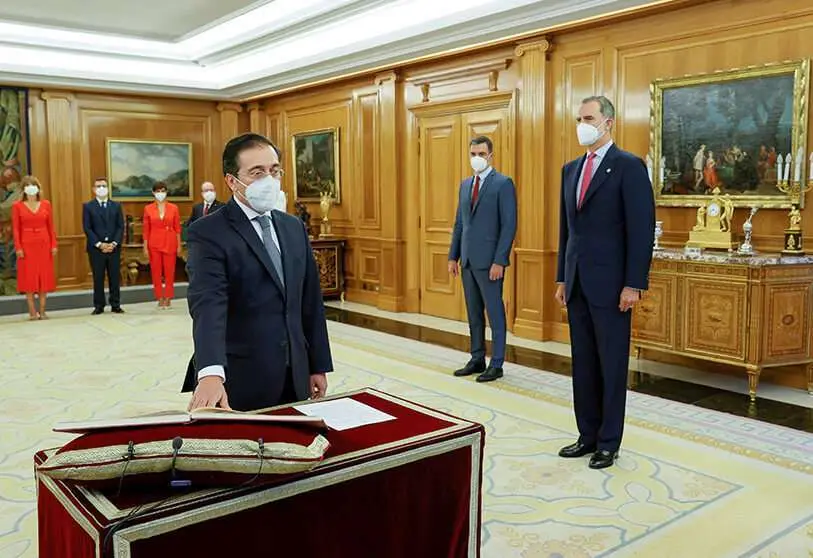Morocco/Spain: keys to a new alliance

The grandiloquent phrase, "Great neighbour and friend of the South", of Spain's newly appointed Minister of Foreign Affairs, European Union and Cooperation, José Manuel Albares, is full of good intentions.
However, the task ahead is not an easy one. For it is not a matter of reinforcing outdated relations, but of reformatting them in order to re-edit others, based on the new common geopolitical order, with dynamics that are highly favourable to a Morocco that has become a regional and continental power.
Will the new minister, Albares, be able to achieve this? Here are some key questions, given that the new minister is taking office in the midst of a deep crisis of confidence, which is forcing Spain to reposition itself.
The world powers are currently on board the continent of the 21st century, competing for its natural resources, for a colossal market and for the opportunities for influence it offers. The United States, Britain, France, China and Russia are betting on Morocco, on its stability and security, with whom they have strategic alliances for political, economic and military cooperation. Morocco's leadership has made it a de facto actor, promoter and driving force, which is why large European companies based in Morocco are triangulating their activities on its back, thus reaching deep into Africa. It is also the gateway and guarantee of access to African resources, where the Maghreb country stands out as the leading investor in sectors such as banking, construction, telecommunications, phosphates and their derivatives, and so on.
Some Spanish companies, and part of civil society, are reluctant to accept the economic achievements of the "great neighbour and friend to the south", thus discarding the competitive, economic and financial advantages that could be obtained if there were shared or cooperative competition with their Moroccan counterparts, which today collaborate with French, English, American, Chinese and Ukrainian companies. A Spanish-Moroccan alliance would also provide perfect complementarity due to proximity, and in all sectors, which requires relations to move to another level, overcoming unfounded fears, since Morocco already has technology, both its own and that of others, in sectors such as aerospace, automobiles, telecommunications, aerospace and energy.
Minister Albares, who is familiar with Tanger and with Franco-Moroccan relations as a former Spanish ambassador in Paris, will have to move away from clichés and courageously tackle the redirection of relations while respecting the institutions of the "great neighbour and friend to the south". The process of democratisation in Morocco is in full progress, unprecedented in the region, and this is recognised by the international community. Although many Spanish pseudo-democrats, some of whom occupy seats in the Spanish parliament, from the left and the extreme left (Podemos) and the like-minded press, are currently silent about the repression in Cuba, which they avoid calling a "dictatorship", they do so with complete impudence towards the "great neighbour and friend to the south". For their ignorance and greater peace of mind, the Moroccan monarchy constitutionally reserves four ministerial portfolios called "of sovereignty" (Interior, Foreign Affairs, Justice and Religious Affairs) that embody the policies of the state. Thus, whoever governs, PJD, socialists, nationalists, communists or independents, state policy remains unalterable, guaranteeing the management of public affairs that require continuity and security against partisan arbitrariness. Moreover, constitutionally, nothing prevents King Mohammed VI from participating in the free market (Morocco is neither Cuba nor Venezuela), with private companies, in the country's economy. All of this is legitimate, because the Moroccan people voted for it in a referendum and it is enshrined in the Kingdom's Constitution.
The main challenge lies in shaping a new Spanish-Moroccan alliance in accordance with the new geopolitical dynamics of the common space, without ignoring Morocco's position on the regional and continental chessboard. A reality that has been ignored, or simply ignored, by Spanish diplomacy and, through ignorance, by most ordinary Spaniards. In this sense, and as Minister Albares himself has said: "What is done abroad has repercussions at home", to which should be added "and vice versa". The challenge for the new diplomat lies, among other things, in knowing how to teach the Spanish people how to explain the geostrategic changes that are taking place abroad, just to the south, specifically in the Mediterranean basin and on the Atlantic flank where the Canary Islands and the southern provinces of the Kingdom share a great neighbourhood and friendship.
To this end, Morocco is, above all, a lethal diplomatic machine, on the basis of which it has built all its international relations, acquiring an indisputable 'soft power', intelligently combining the human, the economic and the political. Consequently, we should aspire to Spanish-Moroccan relations at least close to those that the "great neighbour and friend to the south" has with its European allies, France and Britain, and, on the other side of the Atlantic, the US and China in Asia.
Spain cannot waste any more time. It must take the foreign policy bull by the horns and take advantage of the favourable winds of its 'great neighbour and friend to the south' to reposition itself by abandoning the current status quo. If Morocco is that column of Hercules flanking the Strait of Gibraltar to the south in Abilia, Spain should stand side by side with Morocco, hand in hand, to become that other Herculine column, on the other side of the Calpe shore to the north, building bridges with Europe.
A lot of work awaits Minister Albares, who is believed to have the capacity and ability to revolutionise Spanish foreign policy. Morocco, rather than good intentions, expects gestures of loyalty.

